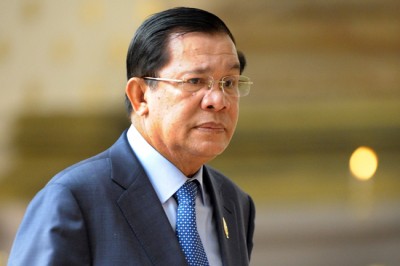Cambodian Premier Reminds Ukraine of the Horrors of Cluster Bombs
Cambodian Prime Minister Hun Sen recalls Cambodia's "painful experience" with US-dropped cluster munitions in the 1970s, which continue to cause casualties to this date.

All Global Research articles can be read in 51 languages by activating the Translate Website button below the author’s name.
To receive Global Research’s Daily Newsletter (selected articles), click here.
Click the share button above to email/forward this article to your friends and colleagues. Follow us on Instagram and Twitter and subscribe to our Telegram Channel. Feel free to repost and share widely Global Research articles.
***
Cambodian Prime Minister Hun Sen, drawing from his country’s painful history with war remnants, has appealed to Ukraine not to utilize cluster bombs after the United States, the country behind his nation’s sufferings to this day, announced its intention to provide such weapons to Kiev.
Hun Sen highlighted Cambodia’s “painful experience” with US-dropped cluster munitions in the 1970s, which continue to cause casualties to this date. Stressing the potential long-term dangers and humanitarian repercussions, he urged both the US and Ukrainian presidents to refrain from employing these weapons, expressing empathy for the people who would ultimately suffer the consequences.
“It has been more than half a century. There have been no means to destroy them all yet,” Hun Sen added.
“I appeal to the US president as the supplier and the Ukrainian president as the recipient not to use cluster bombs in the war because the real victims will be Ukrainians,” he said.
The US has allegedly received assurances from Kiev regarding the mitigation of civilian risks, but the decision remains contentious among humanitarian organizations. Cambodia, itself heavily affected by landmines and unexploded ordnance, continues its ongoing clearance efforts with the aim of eliminating all mines and ordnance by 2025.
Earlier today, Germany’s President Frank-Walter Steinmeier stated that while his country opposes the use of cluster munitions, Berlin should not obstruct the United States from sending them to Kiev in the current situation.
“Germany’s position against the use of cluster munitions is as justified as ever. But we cannot, in the current situation, block the United States,” said President Frank-Walter Steinmeier in an interview for German broadcaster ZDF.
Steinmeier claimed that if Ukraine loses support or means of defense, it could lead to the country’s demise.
“It would be the end of Ukraine,” he stated.
The United States recently announced new military aid, including cluster munitions, to “assist Ukraine”, causing wide criticism from NGOs and embarrassment for some European nations.
Cluster munitions, which disperse multiple small explosive charges, are banned by several countries, including European signatories of the 2008 Oslo Convention.
Steinmeier, who had signed the convention as Germany’s foreign affairs minister, reportedly expressed the need to support the victims of the war.
Russia already warned the US against sending the cluster munitions to Ukraine, and Russian Ambassador to the UN Vassily Nebenzia argued it would count as a bigger step toward escalating the conflict.
Late last month, the US military said despite it being banned by most countries, supplying Ukraine with cluster bombs could be useful against Russia.
A flashback
Ukrainian forces have been using cluster bombs since 2015 in battles against the republics of Lugansk and Donetsk. They fired such munitions on Donetsk on March 14, killing 20 people and wounding 37 others.
A report by The New York Times has recently revealed that Ukrainian troops fired cluster munitions, banned by 110 countries around the world, on a Ukrainian village.
The cluster bombs that the Ukrainian forces used against a village populated with civilians on their own territory are banned by countries around the world for their capacity to haphazardly kill innocent civilians, according to the Convention on Cluster Munitions. Almost 20% of these munitions fail to detonate on impact and remain a threat to civilians long after hostilities end, killing and maiming them indiscriminately.
Ukrainian forces have committed multiple war crimes in the form of deliberate attacks against civilian targets, massacres of civilians, torture of POWs, and indiscriminate attacks in densely populated areas.
*
Note to readers: Please click the share button above. Follow us on Instagram and Twitter and subscribe to our Telegram Channel. Feel free to repost and share widely Global Research articles.

